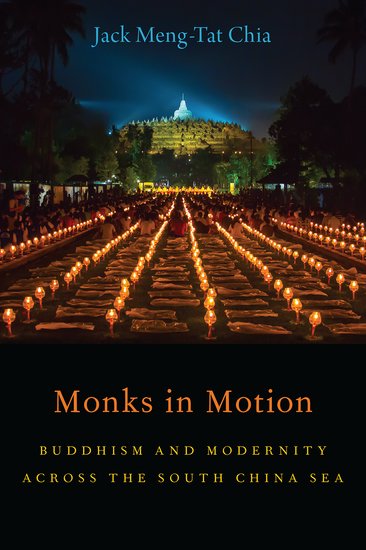Yen Pei: Humanistic Buddhism in the Chinese Diaspora
September 24, 2021

Assistant Professor Jack Meng-Tat Chia (NUS History) was recently awarded the EuroSEAS Humanities Book Prize 2021 for his first book, Monks in Motion: Buddhism and Modernity across the South China Sea (Oxford University Press, 2020). The EuroSEAS Humanities book prize is awarded to the best book on Southeast Asia published in the humanities. Monks in Motion explores the reasons Chinese Buddhist monks migrated to Southeast Asia and investigates the ways in which Buddhist monks created and participated in transregional Buddhist networks spanning the South China Sea. It features the stories of three prominent monks — Yen Pei, Chuk Mor, and Ashin Jinarakkhita — who migrated to different maritime Southeast Asian countries and were responsible for propagating Buddhist teachings and increasing the presence of Buddhism in their respective host countries.
In chapter three, ‘Yen Pei: Humanistic Buddhism in the Chinese Diaspora’, Dr Chia traces the journey of the late Venerable Yen Pei, who started life as the child of a poor farming family in China in 1917 and ended up as a well-respected scholar-monk and social activist in Singapore. The story of Yen Pei’s journey reflects the broader dynamics of migration and transregional Buddhist circulations in the South China Sea at that point in time.
Yen Pei, whose second brother was a Buddhist monk, took to monastic life after attending his brother’s ordination ceremony at Liubaotou Guanyin Monastery. Yen Pei wanted to be ordained like his brother before him. His parents, on the other hand, did not want another child to become a monk and were unwilling to give his brother’s monastery permission to ordain Yen Pei. To fulfil his wish, Yen Pei went to a nearby monastery, Fanjialun Futian Hermitage, to seek ordination. He was eventually ordained as a novice under Venerable Changshan.
His monastic education, which he acquired from several prominent Buddhist seminaries, greatly influenced his three-decade religious career in Singapore. These seminaries include Guanzong Monastery, Minnan Buddhist Institute, and Sino-Tibetan Institute. Yen Pei would eventually receive the opportunity to study under Yinshun, who believed and promoted the ideas of Humanistic Buddhism. Humanistic Buddhism believes that one should strive to follow the example set by Buddha by practicing the Dharma and achieving Buddhahood in this realm. A central argument, as espoused by Yinshun, is that if the Buddha attained enlightenment and taught the Dharma in the human realm, then one should also strive to do so in the same realm.
Yen Pei considered himself to be one of Yinshun’s main disciples and sought to propagate the Dharma and the ideas of Humanistic Buddhism to overseas Chinese communities. He made several trips to Southeast Asia aiming to spread these teachings. These trips soon proved to be major considerations behind his decision to migrate and settle in Singapore. He officially migrated in November 1964.
Yen Pei’s career in Singapore began when he assumed leadership at the Leng Foong Bodhi Institute in Singapore. Although Buddhism was a prevalent religion in Singapore, Yen Pei noted that Singapore’s Buddhist community had little knowledge and understanding of underlying Buddhist doctrines. Instead, the practice of Buddhism was limited to rituals such as the lighting of joss sticks and reciting the sutra. He saw the restructuring of the temple as a way to preach the Dharma and promote Humanistic Buddhism among Singapore’s Buddhist Community. Under his leadership, he transformed the institute into Leng Foong Prajna Auditorium. Relying on the relationships he developed over his years, Yen Pei invited prominent monks from all over the world to deliver guest lectures. He also established several programs that catered to the local Buddhist community. Dr Chia points out that the organization soon became a hub for Dharma education and propagation in Singapore, as well as a significant nodal point in global Buddhist networks.
Yen Pei also established the Singapore Buddhist Welfare Services in the 1980s. The benefits of Singapore’s rapid economic growth were unequally shared, contributing to a growing class consciousness in the country. Humanistic Buddhists believe that one of the ways to practice compassion and kindness in the human realm is to be actively engaged in social issues. As an advocate of Humanistic Buddhism, Yen Pei felt the need to help those of lower socioeconomic status. He channeled his energy and efforts towards three areas: filial responsibility, organ donation, and drug abuse rehabilitation. The ideas and principles of Humanistic Buddhism legitimized his social welfare activities, and eventually developed a close working relationship with the PAP government, which endorsed his social welfare and community efforts. The Singapore Buddhist Welfare Services is now a full member of the National Council of Social Services, providing social welfare services across all sectors of Singapore society.
The ideas of Humanistic Buddhism were first developed in China. Yen Pei, widely considered to be one of the four eminent monks of modern Singapore, was responsible for promoting the ideas of Humanistic Buddhism and translating those ideas into practice in the form of the Singapore Buddhist Welfare Services. Yen Pei’s religious career in Singapore has had profound effects on both the Singapore Buddhist community and the larger civil society.
Read the book here!
